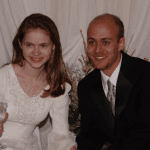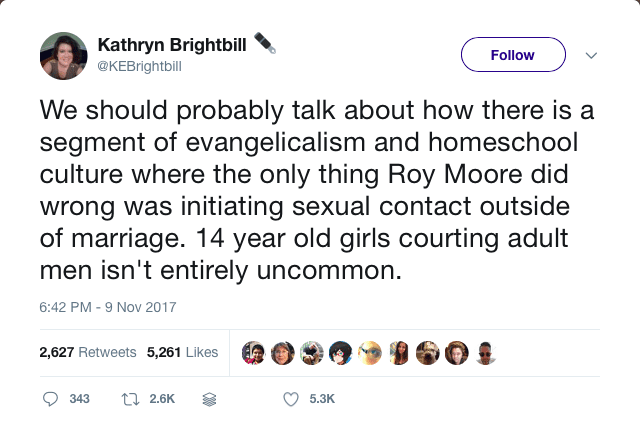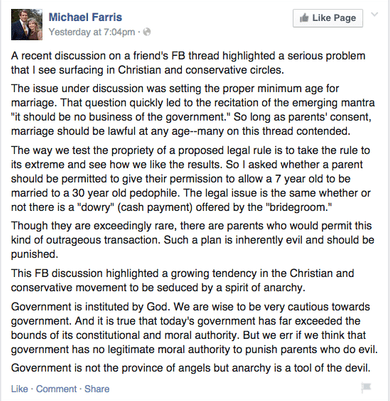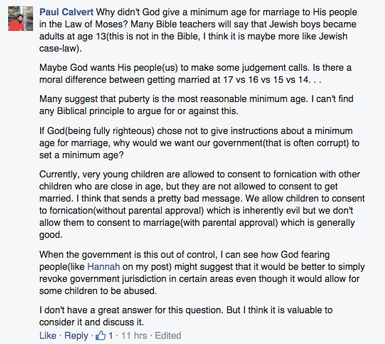In recent weeks, I have been writing posts about evangelical theologian Doug Wilson’s troubling way of handling child molestors and abusers. And by “troubling way of handling,” I mean that Wilson has a habit of writing to judges requesting leniency for men on trial for sexually abusing children. Wilson remains an influential evangelical theologian who is supported by such prominent evangelical theologians and organizations as John Piper and The Gospel Coalition, yet what recent weeks have revealed about his handling of child sexual abuse suggest that he is utterly unfit for ministry.
In the comments on my recent post about Jamin Wight, who sexually molested a young girl from age 13 through age 16, several readers pointed to similarities between the story of his victim, Natalie Greenfield, and the story of Maranatha Chapman. And they were right—the similarities are almost uncanny. In this post I want to tease out both the similarities and the differences and hit on some themes and underlying problems.
First let’s look at the Maranatha story:
In early fall of 1986, [26-year-old] Matthew confessed to [his mentor] Stan that he was troubled by a strong attraction to Stan’s [13-year-old] daughter Maranatha, confessing that he found her “very attractive” and that she had become “a distraction.” “I don’t know what to do about it,” he said. According to Lindvall’s telling, “Matthew was certain this attraction could not be right since Maranatha was so much younger than he.” “Have you ever considered that this may be a good thing?” Stan asked him in response, “How do you know this isn’t from the Lord?” But Stan went on to tell Matthew that Maranatha wasn’t ready for marriage yet, and that he therefore needed to put a hold on his feelings for a while. Matthew continued to be a frequent guest in Stan’s home, constantly in contact with Maranatha and the rest of the family, but was forbidden to tell Maranatha about his feelings or have any physical contact with her.
Shortly after this Maranatha told her father that she had “an interest” in Matthew. As time went by Maranatha found her “attraction” to Matthew “increasingly distracting.” She told her father about her crush as she had been taught to do. Stan told Maranatha that she needed to “keep her heart pure and focused on the Lord” and to “wholly give herself to the Lord without any lingering desire for Matthew.” And Maranatha obediently sought to do just that.
As Natalie tells her story:
[24-year-old] Jamin expressed an interest in me to my parents when I was 14 years old, months after he’d begun grooming me and had already instigated a physical relationship with me. To say I had a crush on him would be an understatement – I was completely infatuated with him, as is common for abuse victims, and had been since shortly after I met him at a church event when I was 13 years old. (No one knew the depth of my affection for him, of course, I think told my parents I thought he was pretty cool.) My parents told Jamin he could wait for me if he wanted to and they’d reassess the situation when I was 18 years old. It was made exceedingly clear that in the meantime there was to be no ‘relationship’ whatsoever.
The similarities are striking. In both stories, a man in his mid-twenties expressed interest in a 13 or 14-year-old homeschooled girl, the girl had a crush on the young man, and the parents told the young man to wait, agreeing to address the question again when the girl was older but not discouraging the match altogether. I want to spend some time on these similarities first, before I move on to the differences in the two stories’ outcomes.
In our society today, it is not considered normal for fully grown men in their mid-twenties to express interest in a 13 or 14-year-old girl. Indeed, such a thing ought to mark a man as a potential predator. It is usual for men in their mid-twenties to be interested in dating and marrying women who are near their age, who have the same physical maturity and lived experience they do. Girls of 13 and 14 are in middle school. The incredibly huge difference in lived experience between a middle school student and a mid-twenties adult ought to forestall any thought of a relationship.
If a man in his mid-twenties were to come to me and express interest in my daughter Sally when she is 13 or 14, I would give him a stern lecture on the inappropriateness of even considering such a thing and then treat him as a someone who is likely a sexual predator and someone who poses a potential danger to my daughter. I might even report it to the police, just to make sure he was on their radar. I suspect most parents would react similarly.
Why didn’t Maranatha’s and Natalie’s parents react by booting the young man in question out of the house as a potential sexual predator? As I discussed in my earlier post, both Natalie and Maranatha grew up in a Christian homeschooling culture that glorifies early marriage and adheres to strong gender roles—men are to protect and support, women are to nurture and keep the home. I grew up in this culture myself, and was disappointed when I reach 18 without a marriage proposal. Katie Travis grew up in this situation and was so worried about being an old maid at 23 that she married a convicted child molester rather than stay on the marriage market.
Another key feature of this Christian homeschooling culture is the importance of a young man approaching a young woman’s father, and not that young woman herself, to express interest in her. Fathers are taught to expect to be approached by godly young men hoping to wed their daughters. In this context, Stan and the Greenfields likely saw Matthew and Jamin as earnest and well qualified young men who had simply jumped the gun by a few years. They may even have been flattered by this proof that they were successfully raising godly, becoming young women.
And now for the differences between the two stories.
While both sets of parents told the young men who approached them about their young daughters that they would have to wait, Stan actively encouraged Matthew to see his attraction to Maranatha as given to him by God. Then, when Maranatha was only 15, Stan gave her to Matthew in marriage. In contrast, the Greenfields told Jamin that he must wait until Natalie was 18 to revisit the question, and stuck to that. Unlike Stan, they were not willing to marry their daughter off at 15 to a mid-twenties man, instead insisting that any talk of marriage must wait until Natalie was 18.
According to Lindvall’s telling of the Maranatha story, Matthew did not have any sexual contact with Maranatha before Stan gave her to him in marriage when she was 15. As Natalie explains in writing of her own story, Jamin sexually abused her from age 13 to age 16. When Natalie was 17, a friend convinced her to go to her parents about the years-long sexual abuse she had suffered at Jamin’s hands. Natalie did, and her parents recognized it as the abuse it was and supported her in going to the police to report it and press charges.
I have a great deal of respect for Natalie’s parents on this point. Their pastor, Doug Wilson, wrote to the judge in the case portraying Jamin’s abuse of Natalie as a consensual sexual relationship. In fact, the judge believed that version of events, equating it to a “homeschool teenage love affair.” But rather than castigating their daughter for having sex outside of marriage or forcing her to marry Jamin, Natalie’s parents recognize it as abuse and supported Natalie in pressing charges. Perhaps not surprisingly, they ended up leaving their church over this issue.
The irony, perhaps, is that these communities often teach that daughters remain under their fathers’ authority and protection even after they turn 18. My own father tried to “protect” me well into adulthood, and attempted to break off my relationship with my now-husband over doctrinal issues. And yet, this same community appears to have systemic problems when it comes to protecting its daughters from predation before they turn 18. This community badly needs awareness raising about how sexual predators operate and what sexual predation looks like.

























